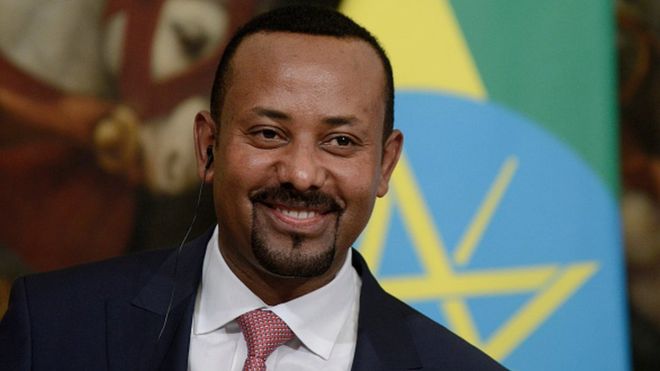
Ethiopia’s prime minister Abiy Ahmed – who made peace with bitter foe Eritrea – wins Nobel Peace Prize.
He was awarded the prize for his efforts to “achieve peace and international cooperation”.
A peace deal, signed last year, ended a nearly 20-year military stalemate with Eritrea following the 1998-2000 border war.
He was named as the winner of the 100th Nobel Peace Prize in Oslo.
A total of 301 candidates had been nominated for the prestigious award, including 223 individuals and 78 organisations.
There had been great speculation over who would win the prize. Under the Nobel Foundation’s rules, nomination shortlists are not allowed to be published for 50 years.
Who is Abiy Ahmad
After becoming prime minister in April 2018, Mr Abiy introduced massive liberalising reforms to Ethiopia, shaking up what was an extremely tightly controlled nation.
He freed thousands of opposition activists from jail and allowed exiled dissidents to return home. Most importantly, he signed a peace deal with Ethiopia’s neighbour Eritrea, ending a two-decade conflict.
But his reforms also lifted the lid on Ethiopia’s ethnic tensions, and the resulting violence forced some 2.5 million people from their homes.
Why did he win?
The Norwegian Nobel Committee said in a statement that Mr Abiy was awarded for his “decisive initiative to resolve the border conflict with neighbouring Eritrea.”
“The prize is also meant to recognise all the stakeholders working for peace and reconciliation in Ethiopia and in the East and Northeast African regions,” they said.
“Peace does not arise from the actions of one party alone. When Prime Minister Abiy reached out his hand, President Afwerki grasped it, and helped to formalise the peace process between the two countries.
The Norwegian Nobel Committee hopes the peace agreement will help to bring about positive change for the entire populations of Ethiopia and Eritrea.”
Who are previous Nobel Peace Prize winners?
Former US President Barack Obama won the Nobel Peace Prize in 2009, for “his extraordinary efforts to strengthen international diplomacy and co-operation between peoples”.
Other notable Nobel Peace Prize winners include former US President Jimmy Carter (2002), child education activist Malala Yousafzai (shared 2014), the European Union (2012), the United Nations and its then-general-secretary, Kofi Annan, (shared 2001) and Saint Teresa of Calcutta (1979).
(BBC)










Recent Comments